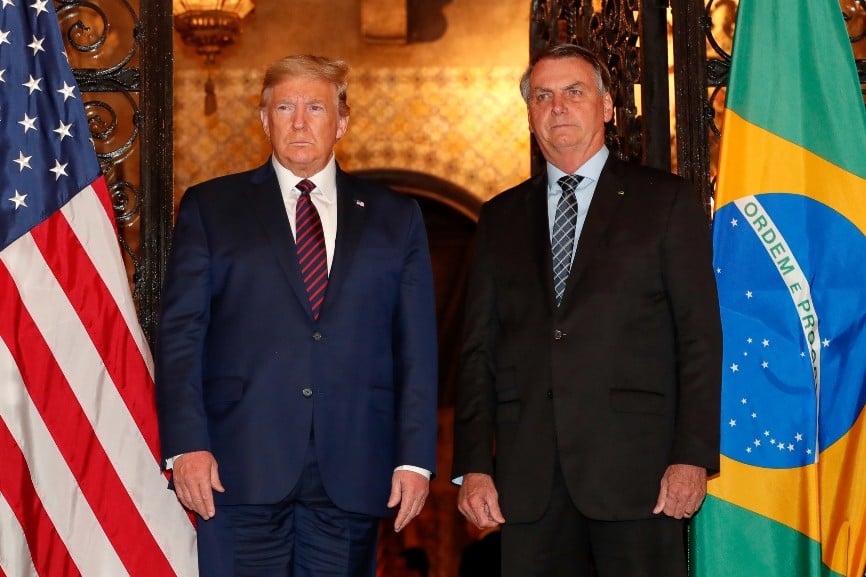Given the disruptive nature of Donald Trump's presidency, pundits are speculating on what his election loss means for politics around the world. Some have suggested that the rare defeat of a sitting US president foreshadows a similar fate for other far-right populists such as Brazilian President Jair Bolsonaro. But that analysis is based on a misreading of the reasons for Trump's loss, and there are no signs of a strengthening backlash against a Brazilian leader who has been dubbed “the Trump of the tropics.” That said, Bolsonaro will likely come under more international pressure to alter some of his policies, especially those on the environment, following Trump's departure.
The verdict on Trump
There is some evidence that suburban voters, particularly women, may have voted against Trump because of his divisive style of politics. But the president lost the election primarily because he mismanaged the Covid-19 crisis—the most important issue for independent voters. And even so, he lost by a much smaller margin than the polls had forecast. In fact, one could argue that Trump's better-than-expected performance suggests his style of politics and message still resonates.
More importantly, the factors that contributed to Trump's rise in 2016—rising income inequality, a growing rift between emerging and traditional sectors of the economy, and a deep disenchantment with established political institutions—appear poised to grow more prominent, not less. A so-called K-shaped recovery could lead different parts of the economy to bounce back at different rates, deepening inequality.
Meanwhile, a large part of the Republican base believes fraud shaped the election result. Trump's shadow over the Republican Party will continue to loom large. Add a Democratic base that has moved to the left over the past fifteen years, and the basis for polarized politics seems to be strengthening, not weakening.
No read-across for Bolsonaro in 2022
Nonetheless, many in Brazil have argued that Trump's loss is a sign that the public is starting to tire of the combative populism he and Bolsonaro have both championed. They have also speculated that Brazil could be isolated on the international stage, and that Bolsonaro may even be forced to dismiss current Foreign Affairs Minister Ernesto Araujo, a renowned anti-globalist, and Environment Minister Ricardo Salles in order to develop a constructive working relationship with President-elect Joe Biden.
Bolsonaro may well face a tough reelection campaign in 2022. But his prospects will depend almost exclusively on domestic factors. More specifically, they will depend on the size of the political hit he takes when the Covid-19 emergency benefit that reached 43% of households in 2020 expires in January, as well as the pace of economic recovery in 2021 and 2022. How the administration manages fiscal policy in the coming three to four months is what will in turn dictate whether the economy can recover on a sustained basis. Trump's election defeat is irrelevant for these issues.
In addition, the odds of Bolsonaro removing Araujo or Salles are very low. Doing so would go over very poorly with the president's ideological base, and a pragmatic relationship with the Biden administration is not predicated on such a move.
Several bilateral initiatives with the US will grind to a halt, but there is little domestic political cost to having a more distant relationship with the US.
The environmental flashpoint
Bolsonaro's public support for Trump during the campaign, and his failure to send Biden a congratulatory note on his victory, will not have gone unnoticed in the president-elect's camp. But the Biden administration will not turn its back on Brazil because of the ideological proximity between Bolsonaro and Trump. Biden is an experienced foreign policy hand and will view a relationship with Brazil in South America as strategic, particularly given the US's intensifying geopolitical competition with China.
But the priority Biden has assigned to environmental issues—his campaign has announced very ambitious targets for the reduction of carbon emissions and said the country will re-enter the Paris climate agreement on day one of his administration—poses a key risk for Bolsonaro. If the pace of deforestation in the Amazon continues to accelerate in the 2021 dry season (which runs from May through September), the Biden administration would add its voice to the rising chorus of international criticism of the perceived inaction of Brazilian authorities.
Bolsonaro has bristled over such criticism in the past, creating the potential for escalatory tit-for-tat rhetoric over deforestation. Higher tariffs on Brazilian exports, or a private sector boycott of Brazilian products, cannot be ruled out.
Still, there are reasons for optimism that a clash can be avoided. Early data from the Amazon after this year's dry season suggests the pace of deforestation in 2021 could experience a partial reprieve, while the Biden administration would like to secure Brazil's cooperation for a deal on new climate actions at next year's COP26 meeting in Glasgow.

 Donald Trump and Jair Bolsonaro in March. REUTERS.
Donald Trump and Jair Bolsonaro in March. REUTERS.
